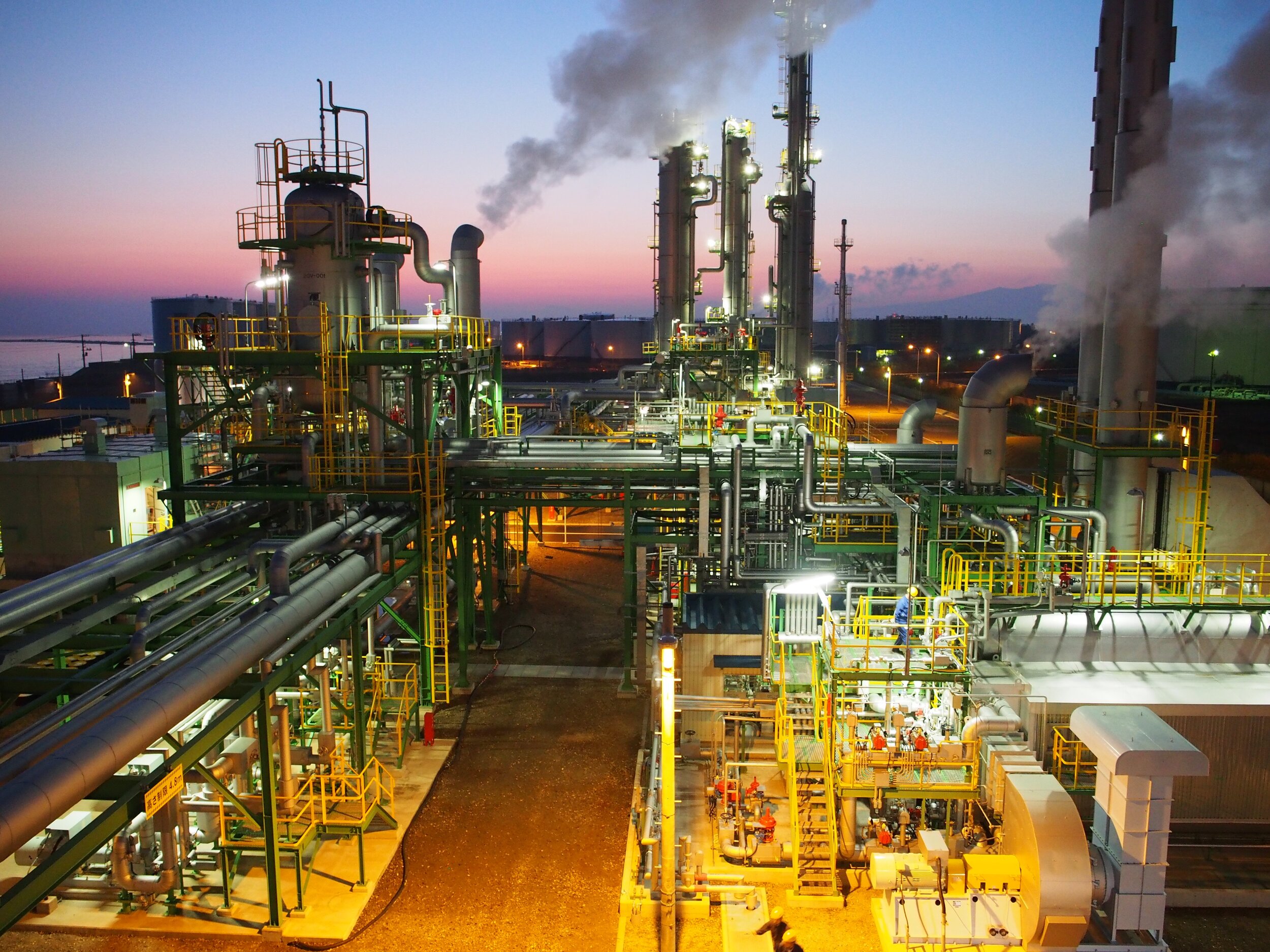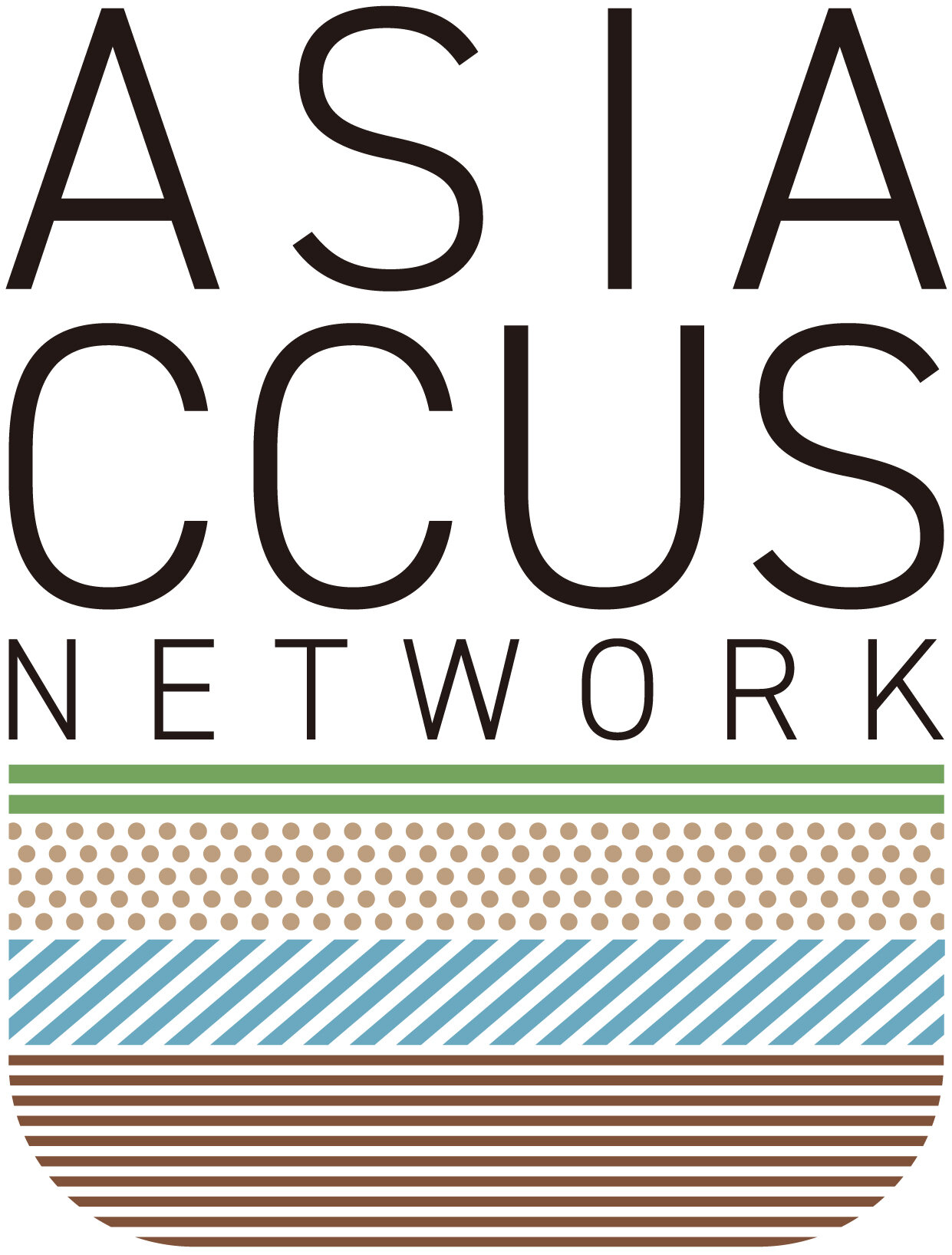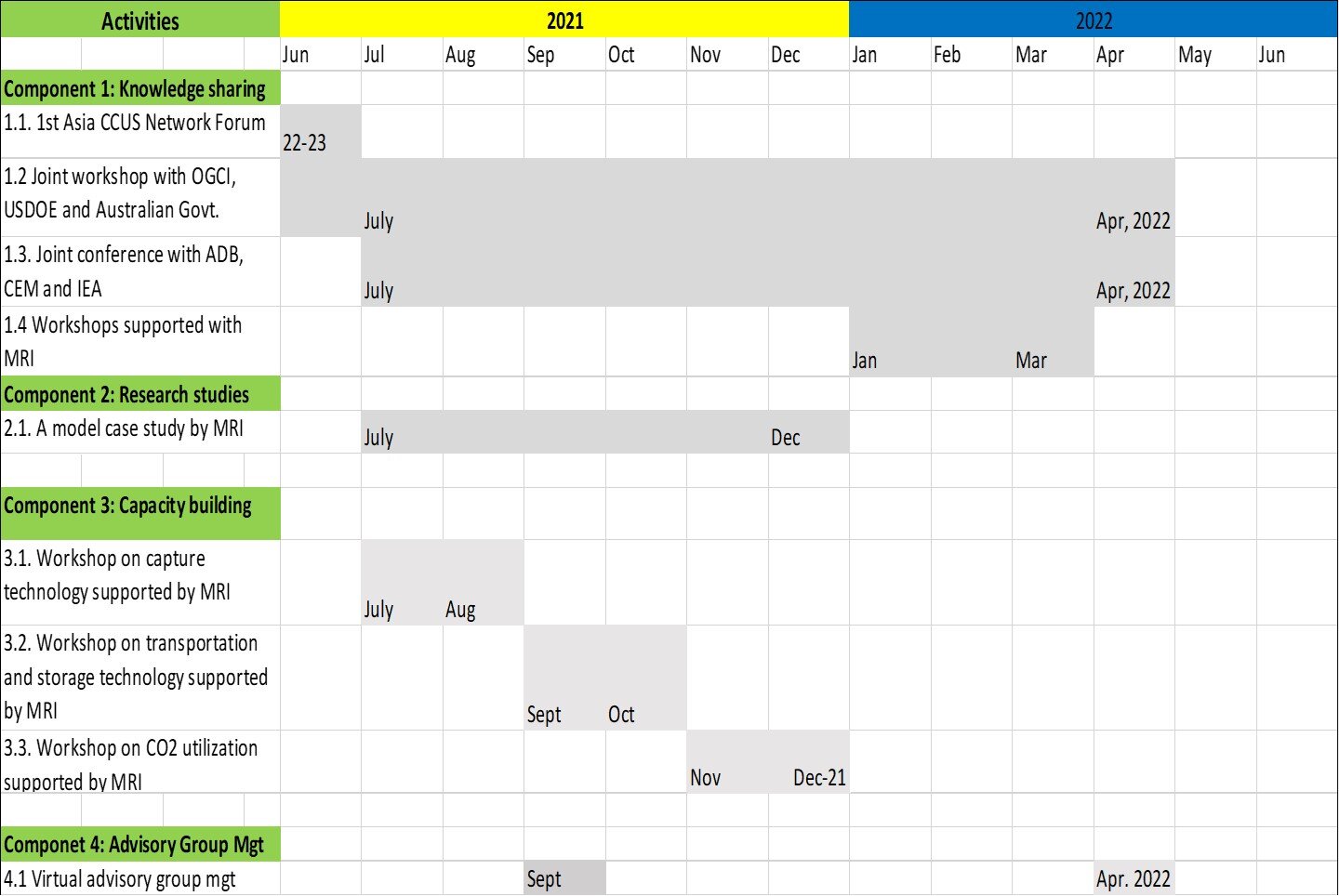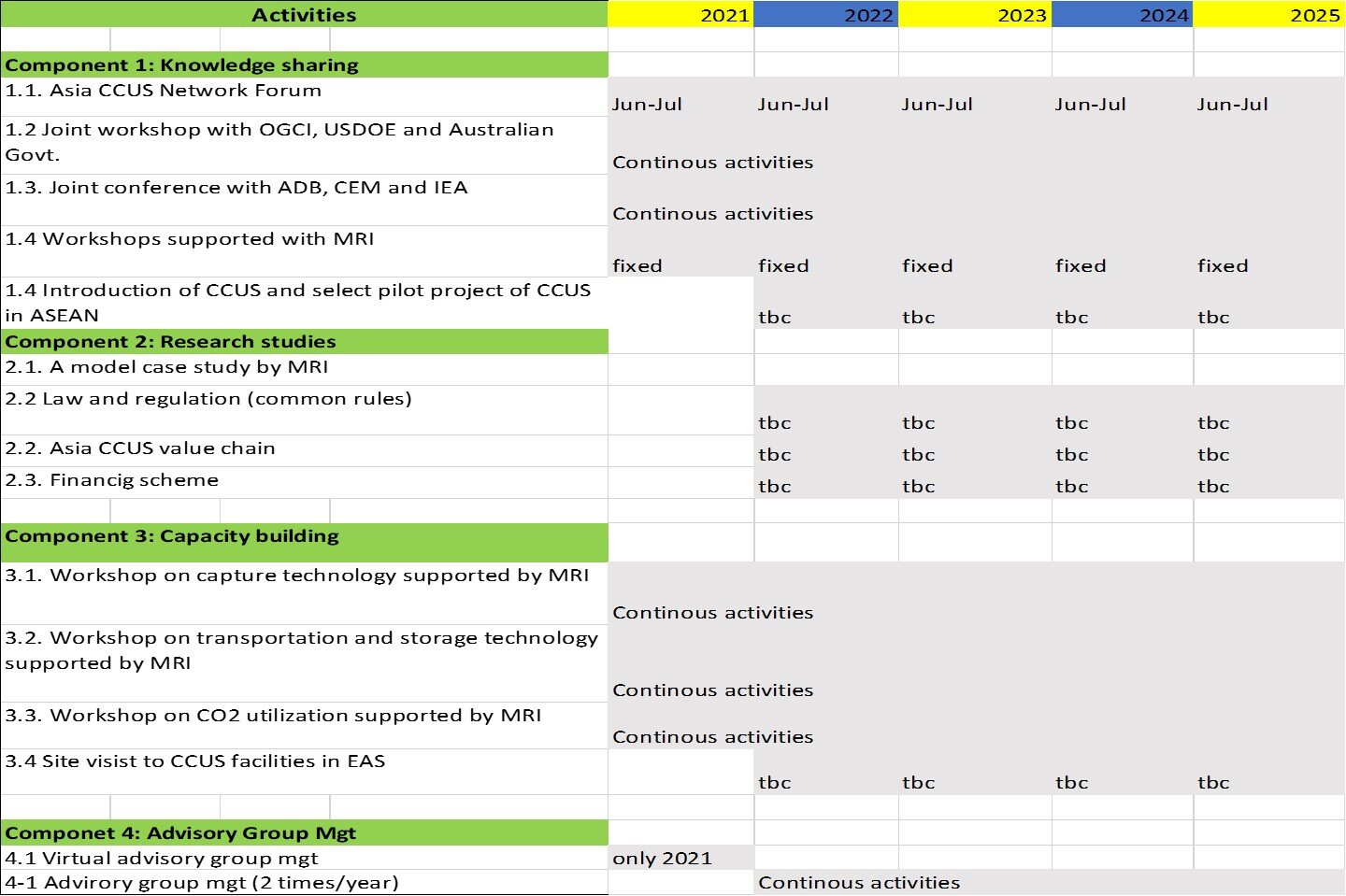
Asia CCUS Network Annual and Mid-term Work Plan
The Annual and Mid-term Work Plan highlights three major activities of knowledge sharing, studies, and capacity building on CCUS.
These activities will contribute to policy formulation in the Asia region to support the development and deployment of CCUS in the foreseeable future.
Annual Work Plan 2021-2022
There are three major components of the Annual Work Plan 2021-2022: Knowledge Sharing, Research Studies, and Capacity Building.
Key milestones for the work plan are:
Joint workshops, conferences, seminars with CEM, US Department of Energy, Australian Government, International Energy Agency, Oil & Gas Climate Initiative, and Global CCS Institute. These events are organised amongst members and supporting members of the Asia CCUS Network.
Studies on the CCUS value chain; common rules and procedure for CCUS deployment; financial analysis of CCUS development and deployment; carbon trading/Joint Credit Mechanism are conducted.
Capacity building and trainings to be conducted in countries in ASEAN and East Asia.
Mid-Term Work Plan 2022-2025
Major activities for the Mid-term Work Plan are the same as the Annual Work Plan; however, there are several additional activities such as site visit to CCUS facilities; selection of the CCUS pilot project in ASEAN and East Asia; deeper analysis of the economic and financial deployment of CCUS in the Asia region; and other studies on regulatory aspects of the deployment of CCUS.
Supporting the Network members in developing appropriate policies to support CCUS deployment.
Conducting specific workshops or seminars to address challenges faced by industries in the development of CCUS.
Conducting specific policy analysis for the CCUS.
Component 1: Knowledge Sharing
Sharing knowledge on CCUS helps countries in ASEAN and East Asia to adopt best practices and experiences that can be applied in their countries.
Asia CCUS Network Forum
Joint workshop/conference with ADB, CEM and IEA on potential business and technology development of CCUS around the globe.
Workshops supported by MRI to support ASEAN member state on the knowledge and development of CCUS.
Component 2: Research Studies
Continuous research studies on CCUS is critical to fill the knowledge gap and suggest appropriate mechanisms for the development and deployment of CCUS.
A Model Case Study by MRI
A model case study for a CCUS project involving an installation with high CO2 emissions, such as coal-fired power plant in ASEAN will be conducted. This will help visualise the whole value chain of a full-scale CCUS project, from capturing to storing the CO2 at its final destination.
Based on public source information, the case study will provide a preliminary financial analysis for the main technical segments of a full-scale CCUS project and consideration for legal, institutional, policy and incentive framework to make the model case study commercially viable will be investigated.
Workshop on CCUS Potential
The results of the model case study including preliminary cost analysis and legal, regulatory, institutional and policy proposals will be presented at 1-2 workshop sessions targeted towards stakeholders of the Asia CCUS Network and high-level ASEAN policymakers.
The workshop’s main focus will be, based on the outcome of the model case study, to provide policy recommendations about necessary laws and regulations to address CCUS challenges such as ensuring safety and long-term CO2 sequestration, as well as effective supporting schemes, such as the provision of financial incentives through carbon market mechanism for a financially feasible path towards CCUS projects.
Component 2: Discuss Preliminary Results Through Workshop
All research findings from the studies will be shared through workshops and seminars.
Workshop agenda:
Introduction to Asia CCUS Network and Its 2021 Activities
Outcome of model case study, cost analysis, and policy proposal
Panel discussion, with the following topics:
Technology options
Cost reduction potential
Policy/Legal requirement
Component 3: Capacity Building - Workshop on Capture Technology
Continuous capacity building and training on CCUS will be conducted for some countries in ASEAN to bridge the knowledge gap on CCUS. The trainings focus on carbon capture, utilisation, transportation, and storage facilities.
Workshop agenda:
Overview of Asia CCUS Network
Introduction to capacity building and overview of CCUS business development in Asia
Technical aspect of carbon capture technology
Overview of carbon capture technologies, their advantages and disadvantages
Case study on chemical absorption technologies
Q&A and discussion
Component 3: Capacity Building - Workshop on Transportation and Storage Technology
Continuous capacity building and training on CCUS will be conducted for some countries in ASEAN to bridge the knowledge gap on CCUS. The trainings focus on carbon capture, utilisation, transportation, and storage facilities.
Workshop agenda:
Overview of Asia CCUS Network
Introduction to capacity building and overview of CCUS business development in Asia
Technical aspect of carbon transport technology
Overview of transportation technologies
Overview of storage technologies
Q&A and discussion
Component 3: Capacity Building - Workshop on CO2 Utilisation
Continuous capacity building and training on CCUS will be conducted for some countries in ASEAN to bridge the knowledge gap on CCUS. The trainings focus on carbon capture, utilisation, transportation, and storage facilities.
Workshop agenda:
Overview of Asia CCUS Network
Introduction to capacity building and overview of CCUS business development in Asia
Utilisation of CO2
Research activities CCU technologies in Indonesia
Case studies on industrial collaboration on Singapore’s first end-to-end decarbonisation process
Q&A and discussion
Additional Activities in Mid-term Work Plan 2021-2025
Some additional activities are available in the Mid-term Plan, including some exposure visits to CCUS facilities in EAS; research studies on rule and regulations of CCUS deployment; value chain analysis of CCUS; specific capacity building training on CCUS upon request from countries; and regular governance board meeting and advisory group meeting of Asia CCUS Network.


